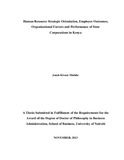| dc.description.abstract | Most researches demonstrating the link between human resource strategic orientation and
firm performance have focused on the private sector, yet understanding this relationship,
in the public sector, in a developing world setting is equally important. Also, the role of
employee outcomes and organizational factors on this relationship has not been
established, yet theory has demonstrated that employee outcomes and organizational
factors can affect this relationship, resulting in significant outcomes at employee and
organizational levels. This study was motivated by the desire to fill these gaps in
knowledge. The study objectives were: to establish the relationship between HR strategic
orientation and corporate performance; HR strategic orientation and employee outcomes;
employee outcomes and corporate performance; to determine the moderating effect of
organizational factors on the relationship between HR strategic orientation and employee
outcomes; and to establish the joint effect of HR strategic orientation, organizational
factors and employee outcomes on corporate performance, vis-à-vis the independent
effect of HR strategic orientation and employee outcomes on corporate performance. The
research design was cross-sectional descriptive survey. Data was collected using
structured self-administered survey questionnaires, from a sample of 123 state
corporations, drawn from a population of 180 Kenyan state corporations. The response
rate was 79.7 percent. Descriptive statistics, correlation and regression techniques were
used to analyze data. The results of the study show a positive and statistically significant
relationship between HR strategic orientation and corporate performance; HR strategic
orientation and employee outcomes; and employee outcomes and corporate performance.
The results also show that the link between HR strategic orientation and employee
outcomes does not depend on organizational factors. However, the joint effect of HR
strategic orientation, organizational factors and employee outcomes on corporate
performance is statistically different from the independent effects of HR strategic
orientation and employee outcomes on corporate performance. The results reiterate the
value of the soft model of HRM strategy in enhancing organizational and employee
outcomes, and the use of systems of HRM practices across sectors. There is need to
redesign the HR policy framework to support the soft HRM strategy, which is key to
performance and employee outcomes. | en |

